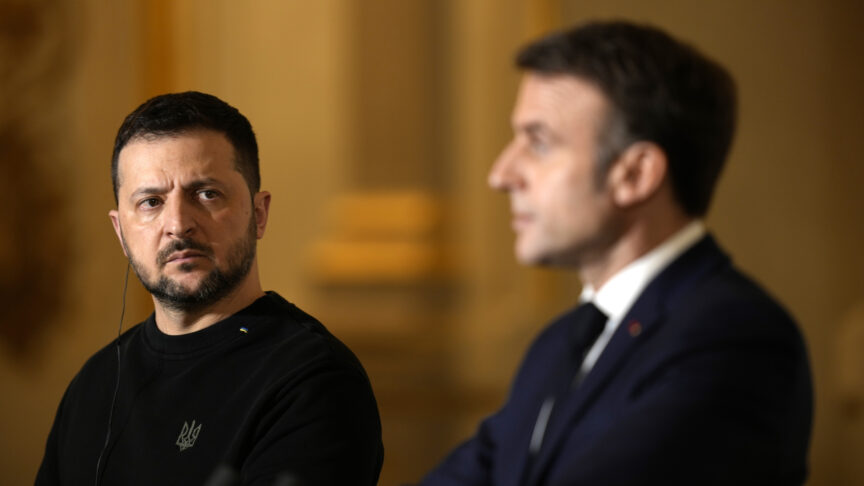Rebuilding a house divided
The EU is more divided on foreign policy now than during the Iraq War. But a house divided against itself cannot stand.
Few of Donald Rumsfeld’s catchphrases gained quicker currency than the notion of an “Old Europe” – France and Germany, along with Belgium and Luxembourg – pitted against a “New Europe” – Britain, Italy, Spain, Portugal , Denmark and the accession countries – over the Iraq War.
Even though the European division was more complicated than the U.S Defence Secretary’s description – with some Western European countries like Denmark and the Netherlands supporting the U.S, and many countries, like the Czech Republic, internally divided – there can be no denying the split that ran through Europe, personified by Tony Blair and Jacques Chirac.
With the US pushing for decisive action against Iraq’s perceived lack of compliance with UN resolutions, the EU failed to stay united and promote an alternative policy. The division reached its rhetorical zenith with the French Foreign Minister’s speech to the UN Security Council in February 2003. The notion of a divided and paralysed continent was further cemented by the French and Dutch “No” votes on the EU Constitution.
But this notion of a period characterised by continental division, prompted by the Iraq War and rooted in different political outlooks, is worth challenging. For, besides the split over Iraq, the period from 1995 to 2005 can also be seen as a period of intra-European cooperation. In 1999, European countries kept together over the U.S-led NATO’s intervention in Kosovo and rallied support for the Balkans. The Union also expanded eastward, including the Eastern European countries.
Progress was made on a range of institutional reforms, including at the Amsterdam Treaty. Even if the French and Dutch rejections of the European Constitution illustrated a European fault-line, it was a different one than between the countries that were for and against the Iraq War.
Now, however, as Iraq is no longer an electoral issue and most European countries with troops still in Iraq – such as Denmark, Poland and Britain – have begun to withdraw them, Europe appears to be divided on every major foreign policy challenge before them:
-
On Russia, EU governments are split between those who want to play hardball on issues like energy and human rights and those wishing to avoid confrontation lest it harm commercial links.
-
On Kosovo, European leaders fear an outbreak of violence and are internally divided. Slovakia, Romania, Spain and Greece harbour reservations about Kosovo’s independence.
-
On Iran, European governments are deeply divided over how far and how fast to go with new sanctions. Britain and France back tough new multilateral sanctions while Italy, Germany and Austria want significantly less serious steps.
-
On Afghanistan, a division exists between those European countries willing to commit more troops and operate in the insurgency-infested south, like Britain, the Netherlands and Denmark, and those preferring to operate in the quiescent north, or whose commitment to the country’s reconstruction remains limited, like France.
-
On climate change, Germany and the European Commission back proposals for mandatory targets to generate 20 percent of energy from renewable sources like wind and solar power by 2020, but Poland, the Czech Republic and France are opposed to such targets.
-
And finally, on Turkey the EU is divided over the terms for opening accession talks; Britain is for, Cyprus, Austria and France against.
It is always possible to find divisions in any alliance, especially one of twenty-seven members representing 400 million people. Also, as is seen in the EU’s history, foreign policy successes are usually preceded by a period of high-profile disagreement, as diplomats do their preparatory work. This well-established modus operandi, seen in the run-up to every European Summit, allows European leaders to defend “red lines” against threats, real or imagined, and thus reap the electoral benefits.
But what is so remarkable today is the scope and depth of division. Comfortable that the split over the Iraq War is behind them, European countries seem to have let themselves go, willing to disagree on all issues without fearing for the consequences.
While Europe may not be divided over a totemic issue such as the Iraq War, it remains deeply divided on almost every major foreign policy issue. With agreement on the Lisbon Treaty and therefore on a new foreign policy set-up, it is time to forge a common European foreign policy. It will require a strong common position on Russia, Iran, Afghanistan, and Kosovo. It will require joined-up thinking on EU’s borders. And it will require bold policies on such cross-cutting issues like climate change, development aid and pandemics.
Such a set of policies will not come naturally but will require work, investment and compromise. Rather than taking the cue from Donald Rumsfeld, the EU would do well to heed another American’s advice, namely Abraham Lincoln, who warned that “a house divided against itself cannot stand.” It is time to rebuild Europe’s divided house.
The European Council on Foreign Relations does not take collective positions. ECFR publications only represent the views of their individual authors.


